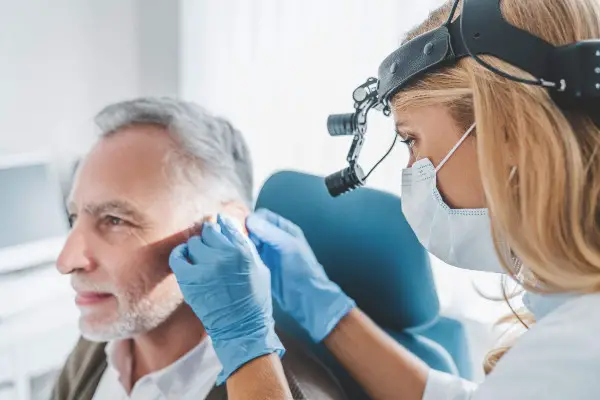Introduction
Imagine walking through a labyrinth, trying to figure out the pattern, decipher the connections, and finding your way out. As parents, when you learn that your child has sensorineural hearing loss, it often feels like you’re entering such a labyrinth. The intricate connections of this condition with other health issues might seem perplexing at first, but with a deeper understanding, the enigma starts to unravel. It’s not just about learning the individual threads but understanding the woven tapestry that affects your child’s health.
This blog post will take you on a journey through the labyrinth of sensorineural hearing loss, unraveling its connections with other conditions such as tinnitus, Meniere’s disease, diabetes, cardiovascular health, autoimmune diseases, and the impact of ototoxic medications. We’ll explore these intersections, share examples, and provide helpful resources. Each layer of knowledge gained equips you with the power to better support your child.
As you traverse this labyrinth, remember, each child’s journey is unique, each challenge is an opportunity to learn, and each step forward is a victory. You are not alone in this. And with every twist and turn, there is a story of resilience and strength waiting to unfold.
AMZ-Lexie Lumen Self-Fitting OTC Hearing Aids
Experience the Ultimate Sound Quality with Lexie Lumen self-fitting OTC hearing aids. These remarkable devices utilize dual microphones to deliver crystal clear sound, immersing you in a world of auditory excellence. Say goodbye to communication struggles in public spaces or on phone calls, as our Telecoil functionality directs speech directly to your hearing aids via an induction loop system. Rediscover the joy of hearing with unmatched clarity and precision.
Embrace an Active Lifestyle with Lexie Lumen hearing aids. Our cutting-edge sweatproof technology, including Nano coating, safeguards against moisture damage, allowing you to wear your hearing aids during outdoor activities like walks, runs, and open-air events. With Lexie, you can live life to the fullest without compromising on the quality or lifespan of your devices. Don’t let hearing loss hold you back—experience the freedom of superior hearing with Lexie Lumen self-fitting OTC hearing aids.
Sensorineural Hearing Loss and Tinnitus Unraveling the Connection
The incessant ring, hum, or buzz that tinnitus brings can be a disconcerting experience, and when paired with sensorineural hearing loss, it presents a unique challenge. Tinnitus often accompanies sensorineural hearing loss, and understanding their relationship can provide valuable insights into managing both conditions effectively.
Take, for instance, young Sarah, who was diagnosed with sensorineural hearing loss and also complained of a constant buzzing sound in her ears. Her doctor explained that this is tinnitus, a common accompaniment of sensorineural hearing loss. The damage to the inner ear not only affects hearing but can also create these phantom sounds.
In another example, teenager Alex, a budding musician, experienced tinnitus and mild hearing loss after frequent exposure to loud music. His doctor confirmed it was sensorineural hearing loss induced by noise exposure, highlighting another possible cause for the co-occurrence.
This intersection of sensorineural hearing loss and tinnitus can be daunting, but appropriate interventions can help manage both conditions and improve quality of life (source).
Sensorineural Hearing Loss and Meniere’s Disease What’s the Link?
The connection between sensorineural hearing loss and Meniere’s disease is another intriguing facet of this labyrinth. Meniere’s disease, a disorder of the inner ear, often leads to sensorineural hearing loss, among other symptoms like vertigo and tinnitus.
Consider the story of Hannah, who started experiencing episodes of vertigo, tinnitus, and noticed a decline in her hearing abilities. Upon evaluation, she was diagnosed with Meniere’s disease. Her physician explained that the excessive fluid in her inner ear – a characteristic of Meniere’s disease – had caused the sensorineural hearing loss.
In contrast, Jake, another child with Meniere’s, showed fluctuating hearing loss, a common trait in this condition. His hearing loss would worsen during Meniere’s attacks and slightly improve afterwards.
These stories underscore the intertwined relationship between sensorineural hearing loss and Meniere’s disease, showing how one condition can influence the other’s progression (source).
Deafness: A Journey of Challenges and Triumphs
Diabetes and Sensorineural Hearing Loss Exploring the Association
The labyrinth gets complex as we delve into the connection between sensorineural
hearing loss and diabetes. Diabetes can affect various organs in the body, and emerging research suggests that it might have an impact on hearing as well.
Take the case of Natalie, a sweet little girl diagnosed with Type 1 Diabetes. Over time, Natalie started to show signs of hearing loss, which was later confirmed as sensorineural hearing loss. Her endocrinologist explained that prolonged high blood sugar levels might damage the blood vessels in the inner ear, leading to hearing loss.
On the other hand, Tim, a teen with Type 2 Diabetes, experienced a similar situation. His hearing loss, however, was progressive, illustrating that the severity and progression of hearing loss may vary among individuals with diabetes.
Understanding this association can help in early detection and intervention, thus minimizing the impact on the child’s life (source).
The Intersection of Cardiovascular Health and Sensorineural Hearing Loss
Just as a heart is central to life, cardiovascular health plays a significant role in the hearing process. Studies suggest a link between cardiovascular health and sensorineural hearing loss.
We can see this connection in the story of Mark, a lively 9-year-old with a congenital heart condition. Over time, Mark started exhibiting signs of hearing loss. His doctors explained that impaired blood flow to the inner ear due to his heart condition might have contributed to the sensorineural hearing loss.
In another case, Julie, an athletic teenager, was diagnosed with sensorineural hearing loss after a sudden cardiac event. Her audiologist emphasized the link between cardiovascular health and hearing, reinforcing the need for regular hearing evaluations in individuals with heart conditions.
These stories highlight the delicate intersection of cardiovascular health and hearing, emphasizing the importance of comprehensive health assessments in children with heart conditions (source).
Tinnitus: why it’s still such a mystery to science
Sensorineural Hearing Loss in Patients with Autoimmune Diseases
The labyrinth of sensorineural hearing loss further extends to its connection with autoimmune diseases. Certain autoimmune conditions may cause inflammation in the inner ear, leading to sensorineural hearing loss.
Consider the story of Bella, a teenager living with Rheumatoid Arthritis. Bella started experiencing sudden hearing loss in one ear. Further tests confirmed it as sensorineural hearing loss, likely linked to her autoimmune condition.
Similarly, young Ethan, diagnosed with Lupus, experienced gradual hearing loss. His physicians identified the link between his sensorineural hearing loss and his autoimmune condition, emphasizing the need for regular hearing check-ups in children with autoimmune diseases.
These examples underline the importance of understanding the potential impact of autoimmune diseases on hearing health (source).
The Impact of Ototoxic Medication on Sensorineural Hearing Loss
The journey through the labyrinth of sensorineural hearing loss leads us to ototoxic medications, drugs that can potentially damage the inner ear and cause sensorineural hearing loss.
Grace, a brave little girl battling cancer, experienced sudden hearing loss after starting chemotherapy. Her doctors informed her parents that the medication she was on was ototoxic and might have led to her hearing loss.
In another case, Ryan, a boy dealing with a severe bacterial infection, was prescribed a specific antibiotic. Post-treatment, Ryan developed sensorineural hearing loss, highlighting the potential side-effects of some ototoxic drugs.
Awareness of such potential effects can guide informed decisions and precautionary measures, ensuring the best possible care for your child (source).
QUIZ - SYMPTOMS OF HEARING LOSS
Conclusion
Just as we navigate through the labyrinth, armed with knowledge and understanding, the intricate connections of sensorineural hearing loss with other conditions begin to make sense. You now understand that tinnitus and sensorineural hearing loss often coexist, making the management of both crucial. You’ve seen how Meniere’s disease can impact hearing, the connection between sensorineural hearing loss and diabetes, the role of cardiovascular health, the implications for children with autoimmune diseases, and the possible effects of ototoxic medication.
Remember the stories of Sarah, Alex, Hannah, Jake, Natalie, Tim, Mark, Julie, Bella, Ethan, Grace, and Ryan. They show that while each journey is unique, it’s the resilience, determination, and love that drive the narrative forward. It’s these stories that illuminate the labyrinth, turning a maze of uncertainty into a pathway of possibilities.
You have stepped into this labyrinth, not as a lost wanderer, but as a beacon of support for your child. With each twist and turn, you gain insight and strength, and you pave the way for your child’s journey. Remember, the labyrinth may be complex, but so is your love, resilience, and determination. You are not merely walking through a maze; you’re charting a course of understanding, hope, and care.
Through the lens of empathy and care, we understand that sensorineural hearing loss is not an isolated condition, but a part of a more intricate health panorama. Recognizing these connections, understanding their implications, and adopting a comprehensive approach can lead to more effective management of your child’s health. At the end of this labyrinth, there isn’t just an exit; there’s a world of opportunities for your child to explore, experience, and embrace.






